Angry People Hold Gathering In Northeastern Iran To Protest Gas Shortage
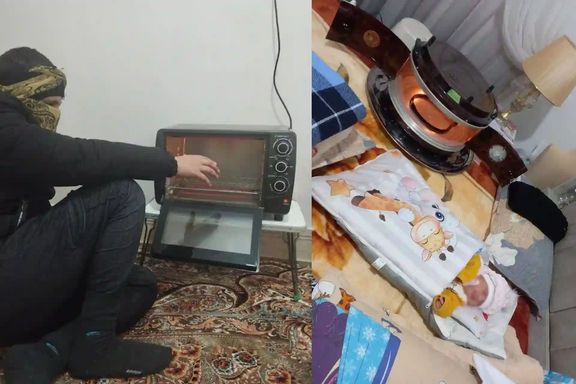
Iranians in the northeastern Torbat-e Jaam city held a protest rally in front of the governor’s office to protest government inefficiency amid natural gas shortage.

Iranians in the northeastern Torbat-e Jaam city held a protest rally in front of the governor’s office to protest government inefficiency amid natural gas shortage.
Videos received by Iran International show that people chant anti-regime slogans, saying “We don’t want incompetent authorities!”
Reports say amid the natural gas crisis, the price of non-gas heating devices like oil heaters have increased sharply in the city in the Khorasan region where the town is located.
A citizen has told local media that due to the crisis he has to warm his children at home using a hair dryer.
Meanwhile, videos on social media show a long queue in Torbat-e Jam to buy kerosene.
Earlier, Oil Minister Javad Owji announced that the city's natural gas is still cut off.
On Monday, people in Torbat-e Jam also rushed to the Red Crescent building to get oil heaters. Videos show some agents prevented people from breaking into the facility.
Some other videos on social media show long queues in Sabzevar in the same province to fill liquid gas and picnic capsules.
Gas shortage, especially in three provinces of Razavi Khorasan, South Khorasan and North Khorasan, has caused many problems for people.
In order to resolve the gas crisis in Tehran and other cities, the Islamic Republic has shut down schools and offices.
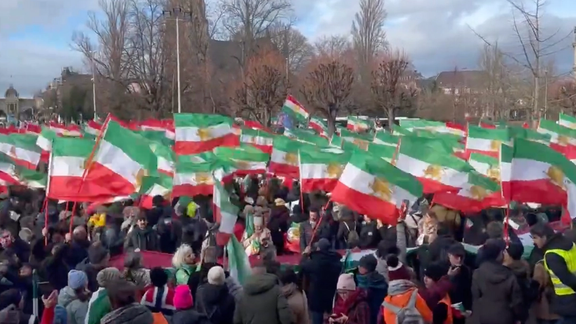
Iranians from across Europe gathered in Strasbourg in northeastern France to urge the European Union to list the Revolutionary Guard (IRGC) as a terrorist organization.
Social media videos show numerous groups of Iranians from different countries who traveled to the headquarters of the European Parliament in the city that has a plenary session to debate the listing of the iRGC in a call already supported by at least 100 members of the body. The Parliament is composed of over 700 members.
Busloads of people from the Netherlands, Switzerland, Sweden and Denmark as well as several buses form the German cities of Hamburg, Frankfurt and Berlin departed early in the morning to arrive in time for the demonstration, chanting slogans against the IRGC along the way.
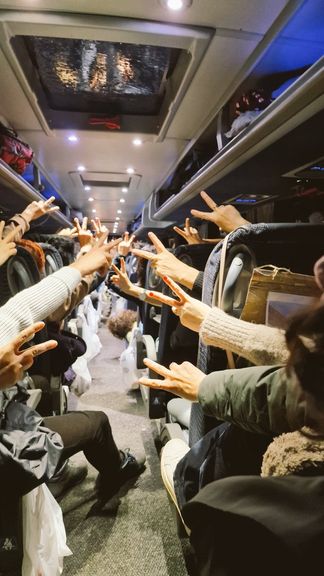
An underground alliance of protester groups in Iran also welcomed and supported diaspora’s initiative. They have prepared posters and flyers to be distributed among the participants. “We wish to declare our full support for listing [the IRGC] as a terrorist organization by the international community,” United Youth of Iran, an underground alliance of revolutionary youth groups from various Iranian cities, said in a statement sent to Iran International. The group has criticized the IRGC’s suppression of protests in Iran, direct and indirect violation of human rights in other countries including Syria and Ukraine, and economic corruption including alleged involvement in drug and arms trafficking and money-laundering by the Guards. “The IRGC’s actions bring nothing but pain, death and corruption to the Middle East and the world,” the statement added.
Expressing support for the rally in Strasbourg, the Association of Families of Flight PS752 Victims, which was shot down by the IRGC with two surface-to-air missiles as it was taking off from Tehran on January 8, 2020, said it has routinely demanded listing the IRGC in its entirety as a terrorist entity. Emphasizing that “the acts of terrorism committed by the IRGC are countless,” the Association said in a statement that “Today, with the people of Iran making their voices heard loud and clear in the Woman, Life, Freedom revolution, it is time that Europe recognize and declare the true terrorist nature of the IRGC.”
In a joint message, prominent opponents of the Islamic Republic have also urged the international community to list Iran's Revolutionary Guard as a terror group. In a tweet published by exiled Prince Reza Pahlavi, football legend Ali Karimi, British-Iranian actress and human rights activist Nazanin Boniadi, journalist and activist Masih Alinejad, and actress Golshifteh Farahani they said, “our request for the international community is clear: put the IRGC on the terrorist list.”
According to some of the participants, time for appeasement of the Islamic Republic has come to an end, and now it is time for action against “the terrorist group” that is the key force to suppress the protesters in Iran and destabilize the region.
During the past few weeks, a hashtag in support of the punitive measure against the IRGC -- #IRGCterrorists -- has been retweeted more than 13 million times by Iranians and foreigners alike. Some social media users have urged Syrians, whose country has been a playground for the IRGC, and Ukrainians whose Russian enemy uses the Iranian-made drones against them, to join the rally and support their cause.
The European Parliament cannot decide to designate the IRGC because the terrorists list is not a list decided by the Parliament itself but by the EU Council, comprised of ministers of each EU country. The members of the parliament are set to vote on a resolution about Iran that would call for the designation of the outfit. The resolution is on the agenda for Thursday and not for the Monday session.
If the resolution garners enough support, it is then upon the national governments of the EU member states to make the final decision. The listing of the IRGC must have a unanimous vote by all 27 EU members in the EU Council.
Members of the UK House of Commons on January 12 unanimously voted for a motion urging the UK government to proscribe the IRGC by listing it as a terrorist organization. Moreover, more than 60 French senators have officially requested that the EU close Iranian banks in Europe and ban the passage of Iran Air planes from European skies, as well as abandon the nuclear agreement known as the Joint Comprehensive Plan of Action (JCPOA) completely.
Unlike the United States which in 2019 under President Donald Trump put the IRGC on its Foreign Terrorist Organizations (FTO) list, European countries avoided the designation in the past few years and prioritized diplomacy with the Islamic Republic in the hope of concluding a nuclear deal.
Many politicians in France, Germany, and other European countries have been keen to pursue the IRGC’s designation by the EU and say that it has been long overdue.
Alireza Akhondi, a Swedish-Iranian member of the Swedish parliament who has been campaigning for the EU designation, said last week that listing the IRGC should be followed by tracing the organization’s money and blocking its money-laundering channels to weaken it. “Let’s rally together, united, and with a common mind to label IRGC as a terrorist organization. Sanctioning criminals is not enough! We need a resolution! Let's make the world a safer place to live in!” he said.
Talks in Vienna to revive the deal, officially known as the JCPOA came to an abrupt stop in March 2022, reportedly for Iran’s insistence that the IRGC be removed from the US FTO list. Later talks elsewhere failed to bring about an agreement.
News that Iran is supplying Russia with kamikaze drones also angered the West and added to the antagonism against Tehran.
So far over 500 protesters have been killed by security forces, mainly consisting of the IRGC and its Basij militia. Four protesters have been executed so far by the state after hasty trials devoid of any regard for due process. Others are on death row.
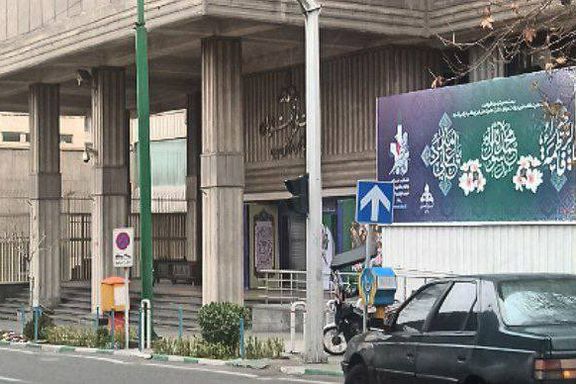
Damning evidence of shambolic management by the government has surfaced in Iranian media as freezing arctic weather and energy shortages have hit the country.
According to Rouydad24 website, during the past days the government has been so overwhelmingly surprised by the impact of a mixture of cold weather and a natural gas shortage that different officials announced several conflicting plans ranging from a total closure of private and public businesses and schools to shutting down factories and poultry breeding farms causing massive financial loss.
"Not only they do not know how to supply gas to homes, schools and businesses, they also don’t know how to handle the scandal," Rouydad 24 quoted a citizen in Tehran.
The government spent all Friday evening and Saturday morning correcting or cancelling previous announcements. In the meantime, parts of the country including the Khorasan region spent days in darkness and freezing cold. In Torbat-e Jaam, the local governor said no one in the government can do anything for the problem.
Social media users and other media outlets in Iran sarcastically noted that while Iranian officials including nuclear negotiating team member Mohammad Marandi and Oil Minister Javad Owji had predicted a difficult winter for Europe, no European country is facing a winter harder than what Iranians are currently experiencing.
But hardliner media such as Kayhan newspaper as well as hardliners on social media repeated fabricated stories about Europe's inability to cope with the winter cold. Kayhan said people in the UK are burning cat pooh to keep their homes warm!
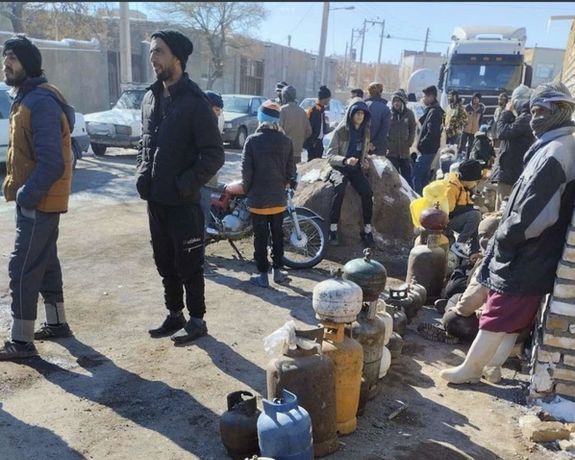
Visiting a gas supply center Sunday morning, President Ebrahim Raisi promised to solve the problem by no later than 2026! At the same time, people in many parts of Iran rushed to dangerous makeshift gas supply centers where profiteers filled their small capsules with liquid gas out of pressurized larger cylinders. Iran International TV showed citizens in Babol in northern Iran going from one gas station to another only to find out that neither gasoline nor natural gas (LNG) was available.
During the past two days all that the government could think of as a solution was closing down offices and businesses and suggesting that people should put on warm clothing. Even pro-government media such as the ultraconservative Farhikhtegan newspaper criticized the government.
Rouydad24 recalled a statement by Majles Speaker Mohammad Bagher Ghalibaf who had said to Fars news agency: "The government has no plan or objective about what it needs to do. And where it has a plan, it lacks a will to carry it out." This comes while the government understands it cannot produce enough gas to keep everyone warm during winters and to keep industry going.
Meanwhile, Khabar Online website attributed the problems to the government's wrong analysis and its failure to see that the winter was going to hit Iran harder than Europe. The website charged that Raisi is lost among his ill-informed advisers such as Mohammad Marandi.
Khabar Online recalled that Oil Minister Javad Owji had said last year that "Iran is capable of supplying gas to its neighbors and even to Europe." Later, like Marandi, the oil minister also predicted on live TV that "Europe will be facing a difficult winter." According to Khabar Online, Iranian "experts" working with the Raisi administration are still not quite sure whether Iranian are burning more gas at home or at their outdated industries. The website said that what the "experts" tell the government is based on "wrong data."
Iran has massive oil and gas resources, but it desperately needs investment and Western technology to utilize those resources. But this is not likely to materialize before Tehran can resolve its foreign policy impasse with the West.
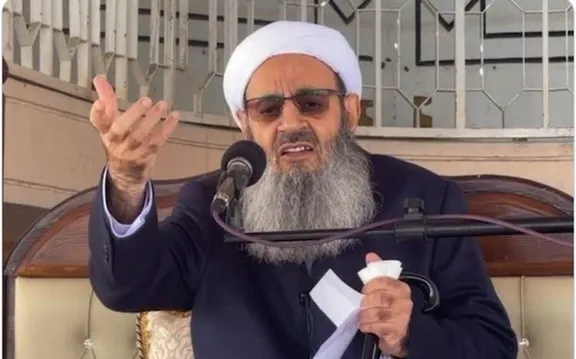
Mowlavi Abdolhamid, the most influential Sunni cleric in Iran, has slammed the "false and baseless allegations" against him by the government’s official paper.
Iran Daily, the formal government newspaper, on Saturday lashed out at the Sunni religious leader of Zahedan, near the border with Pakistan, claiming that Mowlavi Abdolhamid is trying to lead “riots”.
Iran daily also noted that the Friday Imam of Zahedan in the largely Sunni southeastern Sistan-Baluchestan province continues to play his “destructive role against national security and unity”.
However, in its statement, the office of Mowlavi Abdolhamid said that after the September ‘Bloody Friday’ in Zahedan, “some inside and outside the country wanted to avenge the bloodshed, but the prominent leader has prevented that.”
The Bloody Friday took place September 30, when security forces killed around 100 people, and injured hundreds more as part of their crackdown on nationwide protests following the death of Mahsa Amini in police custody in mid-September.
As people congregated for prayers on that day, many began protesting against the government as people in more than 100 other cities were doing. As some approached the headquarters of security forces in the city, Revolutionary Guard troops opened fire, killing nearly 100 civilians.
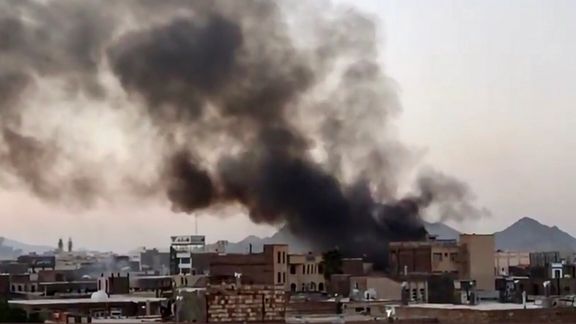
After the Bloody Friday of Zahedan, Mowlavi Abdolhamid held Supreme Leader Ali Khamenei responsible and demanded the cancellation of death sentences for protesters. He also continued calling for justice and respect for the people, gaining support from non-Sunni Iranians.
“The officials of Iran newspaper apparently do not know or have forgotten that on September 30, a bloody massacre and an unprecedented crime took place in Zahedan, in which nearly 100 people - including a woman and several children - were killed by the direct fire of security forces while more than 300 people were also injured,” reads the statement.
“In a situation when it was expected the crime would be condemned by the country's high-ranking officials and the perpetrators be held accountable, so far the government has neither censured the killings nor taken a step towards arresting the perpetrators.”
In another part of the statement, the office of the prominent Sunni leader stated, “Not only the people were not provoked by Mowlavi Abdolhamid and the Makki Mosque officials, but they controlled them to a great extent to maintain security.”
At the end the statement tells the editorial staff of the Iran newspaper to “increase their knowledge about the Sunnis in Iran, especially the people of Sistan and Baluchestan and urge the officials of the Islamic Republic to serve justice to those officers who shot directly at people.”
Earlier in November, the hacktivist group Black Reward targeted the data servers of Fars news agency, a media network affiliated with the Islamic Republic's Revolutionary Guard, releasing several documents to media indicating that Khamenei is dismayed by Mowlavi Abdolhamid’s remarks.
The documents also revealed that instead of arresting or harming him, Khamenei ordered underlings to tarnish Abdolhamid’s reputation so that his influence would decrease among the Sunni population of the country.
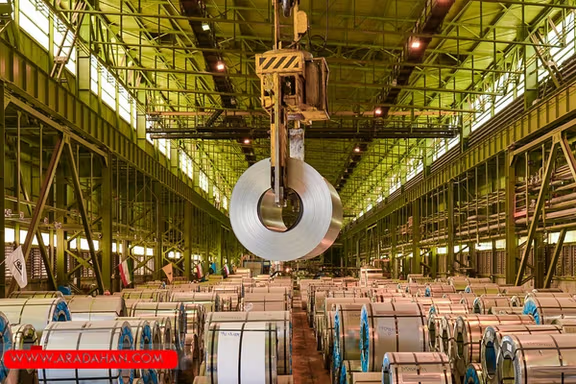
An Iranian industrialist says the gas and electricity shortage will probably lead to a two-million-ton decrease in the country’s steel production.
In an interview with ILNA on Sunday, Reza Shahrestani said there is a severe gas shortage in steel companies, adding that the steel industry needs 40 million cubic meters of gas daily, but at present their consumption has reached 15 million cubic meters per day.
He further added that almost 50% of the electricity supply for industries has been cut off too.
“Gas shortage has also led to electricity shortage because the current amount of natural gas does not meet the needs of power plants to produce electricity,” he underlined.
“It seems that the gas and electricity shortage will be more severe next year and if it continues like this. It will have a tangible impact on the production rate of all industries,” said the member of board of directors of the Steel Manufacturers Association.
“In my opinion, the people, who are in office at the oil ministry, are not up to the task, so we are witnessing inefficiency in all fields,” reiterated Shahrestani.
While the Islamic Republic officials predicted a bad winter in Europe, offices and schools in Iran have been closed for days due to a serious natural gas shortage.
Iran has failed to invest in its gas production sector, although it has the world’s second largest reserves. The distribution network also needs upgrades as more than 25 percent of the gas is lost during transfer.
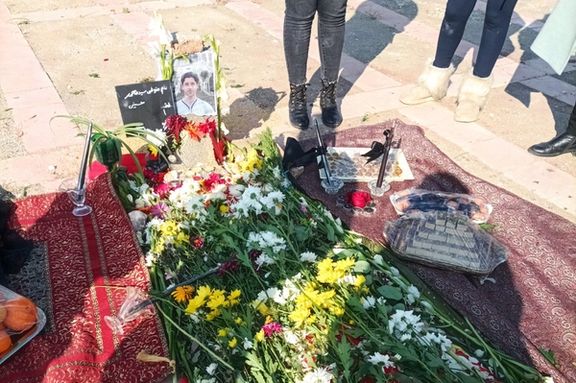
Grieving over the execution of Iranian protester Mohammad Hosseini, several young women gathered at his grave to mourn his untimely death that has cast a somber gloom on the country.
In a video sent to Iran International on Sunday, a woman is heard addressing Mohammad, who was hanged on January 7, telling him that he has numerous sisters now, while another woman is heard weeping in the background.
"Dear Mohammed, my good brother, now you have so many sisters here, you are not alone anymore, we came from a far distance in this cold because you sacrificed your life for us, we all love you, you are in our hearts," the woman said.
The 39-year-old – with no apparent family members -- was one of the loneliest victims of the regime’s crackdown, and his hanging drew massive reactions on social media, where Iranian can speak freely. Soon after his death, he became an icon of solitude in the face of the Islamic Republic’s oppression. His grave is regularly showered with flowers and people distribute food and sweets in the honor of their new hero, as is customary by bereaved families in Iran. There are numerous social media posts by people who visit his grave to show that he is not alone, saying all Iranians are his family.
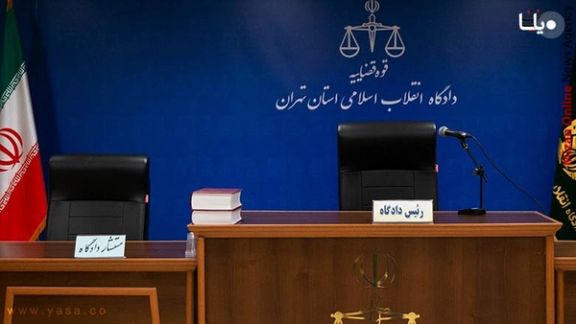
The regime hanged Hosseini along with Mohammad Mahdi Karami for allegedly killing a member of the security forces during nationwide protests that were triggered following the death of 22-year-old Kurdish woman Mahsa Amini in police custody in September. The convictions were not based on a criminal charge related to the murder per se, but they were charged with ‘moharebeh’, meaning “war against God”, a vague religious concept. The Islamic Republic applies the charge to people who might get into a confrontation with security forces during protests.
The executions led to condemnation by many countries and summoning of Islamic Republic envoys in several capitals, as well as a global outcry by politicians and human rights activists. Moreover, lawyers of the two young protesters say the judiciary executed them so hastily that there was no chance for legal follow-up on their cases.
So far, the government has executed four protesters and eleven others have received the death penalty, some for less serious charges than murder, while at least 109 protesters face charges that could end in death sentences for them, an Iranian human rights group based in Oslo has reported. The Iran Human Rights Organization said in its latest report that this figure is a minimum estimate as most families are under pressure to stay quiet, and the real number is believed to be much higher. According to the US-based Human Rights Activists News Agency (HRANA), nearly 20,000 people have been arrested during the antigovernment rallies.
While protests continue usually during the mourning ceremonies for the third, seventh and the 40th day after the death of protesters, the Islamic Republic is issuing death sentences, long prison terms and floggings to quell the revolt.
Earlier in the week, the judiciary announced that a court has sentenced three others to death for “war against God” in a case known in media as the "Khane-ye Esfahan." Three more were also sentenced to death in another case over antigovernment protests in the northern city of Nowshahr. One of them, Javad Rouhi, received three death sentences on charges of "corruption on earth" and "moharebeh" and "Apostasy through desecration of the Quran and other Islamic sanctities as well as burning the Quran.”
This week, branches of the revolutionary courts in different cities continued to issue heavy sentences against people detained during the protests. For example, Mehdi Sabzehparvar was given a five-year sentence, Nazli Saeedi was sentenced to two years ban from leaving the country as well as 15 months of prison, dentistry student Behzad Ghadiri was sentenced to 50 lashes in addition to more than three years of prison, and Amin Amanat was sentenced to four years on charges of "acting against national security" and "propaganda against the regime."